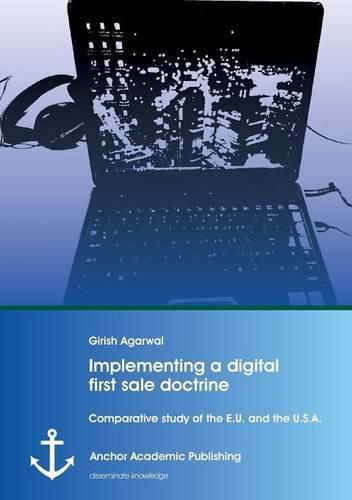Implementing a digital first sale doctrine: Comparative study of the E.U. and the U.S.A.
Girish Agarwal

Implementing a digital first sale doctrine: Comparative study of the E.U. and the U.S.A.
Girish Agarwal
This title is printed to order. This book may have been self-published. If so, we cannot guarantee the quality of the content. In the main most books will have gone through the editing process however some may not. We therefore suggest that you be aware of this before ordering this book. If in doubt check either the author or publisher’s details as we are unable to accept any returns unless they are faulty. Please contact us if you have any questions.
Consumption of copyright materials such as, books, music, games, has changed dramatically in the internet age. We no more consume them as tangible goods. Instead we consume them as digital goods, which have characteristics different from tangible goods. The first sale doctrine in copyright law has been applied to tangible copyright goods since it was codified in the United States of America’s Copyright Act of 1909. But due to the difference in the method of consumption of copyright goods, it is hard to apply the doctrine to digital ones. The question whether it should be applied to digital goods gained prominence when Redigi, a second hand market place for digital copyright goods, was sued by Capitol Records Inc. for infringing its copyright. Is it appropriate to abrogate the doctrine when it comes to digital goods or whether the doctrine should be applied irrespective of the method of consumption, takes centre stage. There are divergent views to this debate. In the European Union, after the UsedSoft case, the view is generally more favourable towards the application of the doctrine to digital goods, whereas, in the United States of America the view is more restrictive. But what copyright needs is a harmony between the divergent views, more favourably towards the views of the European Union, since, there have been technological advancements that do replicate the transfer of tangible goods in the digital domain. The doctrine of first sale is necessary in copyright law, irrespective of the method of consumption, as it tends to achieve a dual purpose. The first is public benefit. This it achieves by allowing more people to have access to literature and art. The second is economic benefit. It increases the overall economic activity by creating a market for second hand goods. But what should be kept in mind is that digital goods do have characteristics that make them easy to copy and distribute, which increases piracy. But should the answer to the problem lie in abrogati
This item is not currently in-stock. It can be ordered online and is expected to ship in 7-14 days
Our stock data is updated periodically, and availability may change throughout the day for in-demand items. Please call the relevant shop for the most current stock information. Prices are subject to change without notice.
Sign in or become a Readings Member to add this title to a wishlist.


